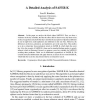23 search results - page 3 / 5 » On the Role of Key Schedules in Attacks on Iterated Ciphers |
FSE
1997
Springer
14 years 1 days ago
1997
Springer
Matsui's linear cryptanalysis for iterated block ciphers is generalized to an attack called. This attack exploits a weakness that can be described by an e ective partition-pa...
JOC
1998
13 years 7 months ago
1998
The security of hash functions based on a block cipher with a block length of m bits and a key length of k bits, where k ≤ m, is considered. New attacks are presented on a large ...
SACRYPT
1999
Springer
14 years 4 days ago
1999
Springer
DEAL is a six- or eight-round Luby-Rackoff cipher that uses DES as its round function, with allowed key lengths of 128, 192, and 256 bits. In this paper, we discuss two new result...
IACR
2011
12 years 7 months ago
2011
The hardware-attractive block cipher family KTANTAN was studied by Bogdanov and Rechberger who identified flaws in the key schedule and gave a meet-in-the-middle attack. We revis...
JOC
2000
13 years 7 months ago
2000
In this paper we analyze the block cipher SAFER K. First, we show a weakness in the key schedule, that has the effect that for almost every key there exists on the average three an...

